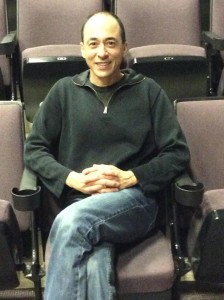
Speaker Teja Arboleda after the event. Photo taken by Julia Hudgins
Diversity and inclusion leader Teja Arboleda shared his expertise on the concept of race to Western Carolina University’s students in the UC Theater at 7 p.m. Wednesday, Feb. 3.
During the evening Arboleda made the audience question what the real definition of race was. Is the concept of race real? Can you quickly or easily decide someone’s race by simply how they look? Or is race just, in Arboleda’s words, a ‘pigment of our imaginations’?
Arboleda went on to challenge the audience to question if they could identify race or if they were just playing into the stereotypes that were built into our society; stigmas the average person doesn’t think about because it is interwoven into the fabric of their day to day lives.
“Race is a four letter word that we are obsessed with… [However] the concept of race is very difficult to discern mostly because we don’t exactly know how to tell where one race begins and the other ends.” Arboleda said.
He put these stigmas to the test by showing the audience Raceoff, a video he created with 13 different people, and the object of the video is to find out when one person becomes or morphs into another. If the ideas that society has about race are true, and race is easily identifiable then finding each specific person or race in the video would be easy. However no one has ever gotten the video correct.
Coming from a background in education, Arboleda lectured with a performer’s flare but with a teacher’s end game in mind. Every WCU student who left the UC Theater Wednesday learned something about the history of how people are categorized into different races, the concerning racial categories on the United States census, and they also learned exactly how much of their biology has anything to do with race.
“Our bodies are made up of 50 trillion cells… six billion DNA three billion base pairs…46 chromosomes and out of all of that, out of all of the trillions and billions and everything, .01 to .02 percent of our makeup has anything to do with race. So the color of your skin, the texture of your hair, the shape of your eyes, nose and lips those things that we [think] tell us your race; only .01-.02 percent of you has anything to do with any of that.” Arboleda said.
However the lecture was far from boring or obscure because these kinds of issues affected many of the people in the audience and no doubt many students on WCU’s campus.
“People assume with my last name Rodriquez that I speak Spanish and that my whole family does. So in second grade I was in an English as a second language class. But I don’t know Spanish and they just assumed that I did. So they started to speak to me in Spanish and [when I didn’t know] they finally asked me if I spoke Spanish and I told them no, they dismissed it and let me go back to my regular classes.” Said WCU student DeAnna Rodriquez.
Arboleda’s ethnicity includes African-American, Native America, Filipino, Chinese, German, and Danish. He has traveled the world, visiting 22 countries in total. He is also an author, instructor and father. For more information about Arboleda you can visit his website.
Related article: “RaceOff” in front of WCU Students


